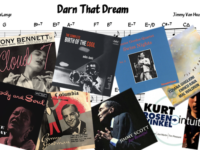by Nick DeRiso
Billie Holiday’s voice, fragile and thin at the end, belied the strong-willed fighter she always was.
This record, dotted with tunes she’d once owned two decades before as a bubbly bird in front of big bands, makes the argument for her.
By the mid-1950s, the hard-living Holiday had lost some dexterity, but none of her gumption. Few singers in the autumn of their years would chance reinterpreting their own masterworks; fewer still would have such resounding success at it.
That starts with a new take on “I Must Have That Man!” — one of her more famous and joyous 1930s hits with Lester Young, now transformed into a grieving cry for someone who’s gone. Elsewhere, Holiday updates earlier versions of Irene Kitchens’ “Some Other Spring,” as well as “God Bless The Child” and the devastating protest song “Strange Fruit” (embedded below).
While it can be argued whether these are definitive, I’ve grown to cherish them more. Holiday adds startling new shades of meaning, turning phrases that might have seemed like ordinary rehash on anyone else’s record into a demand for new reflection.
The title tune, inspired by Holiday’s autobiography of the same name, is notable for its ringing intro by trumpeter Charlie Shavers. “Lady Sings the Blues,” in fact, features something of an all-star septet of jazz musicians — including clarinetist Tony Scott, pianist Wynton Kelly, guitarist Kenny Burrell — but this is no old-school JATP blowing session.
Instead, they lay back, offering undulating music beds so that Holiday can stretch out. She does. And what Holiday has lost in traditional technique, she redoubles with feeling.
She begins by admitting to “Trav’lin’ Light” — because her lover has gone. After taking apart the once-bubbly “I Must Have That Man!” with a surgeon’s precision, then accepting that her heart “won’t ever mend,” Holiday emerges on the title track with a radiant defiance: “Ain’t gonna sit around and cry — I know I won’t die.”
Finally, there’s “No Good Man,” one of two concluding tunes co-written by Irene Higginbotham and Dan Fisher (after the terrific “Good Morning Heartache”). A requiem for romance, it’s as brutal a rebuke from a broken heart as I’ve heard.
Holiday had, for me, at the end an even greater power to tell her own story in a lyric. Her candid toughness, poignant musicality and unique rhythm — things that inspired so many of the 20th century’s very best singers, from Sinatra into pop music — never left her.
- Nick DeRiso’s Best of 2015 (Rock + Pop): Death Cab for Cutie, Joe Jackson, Toto + Others - January 18, 2016
- Nick DeRiso’s Best of 2015 (Blues, Jazz + R&B): Boz Scaggs, Gavin Harrison, Alabama Shakes - January 10, 2016
- Nick DeRiso’s Best of 2015 (Reissues + Live): John Oates, Led Zeppelin, Yes, Faces + others - January 7, 2016



